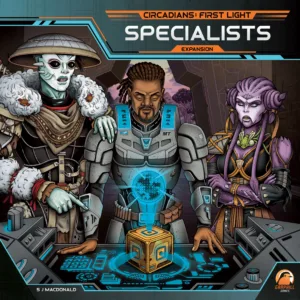 I really enjoyed Circadians: First Light. At Gen Con this year, Renegade Games showed off several of their upcoming releases, one of which was an expansion for Circadians: First Light called Specialists.
I really enjoyed Circadians: First Light. At Gen Con this year, Renegade Games showed off several of their upcoming releases, one of which was an expansion for Circadians: First Light called Specialists.
I was intrigued. On one hand, Although I loved the base game, do we really need to expand EVERY board game? On the other hand, I have enjoyed almost every offering Shem Phillips and SJ Macdonald have worked on together.
Luckily, I was able to obtain a copy of the expansion around Christmas. Did I like it? Love it? Or is this another unneeded expansion? Here are my thoughts on the Specialists expansion.
Expansion Overview:
The Specialists expansion adds a number of components to Circadian: First Light. The highlights include 2 new extensions to the Negotiations board and 4 Incident tokens, 2 new double sided Faction boards, 4 Outpost boards and tiles, 1 new Station board (the Temple), new Contract and Event cards, new Ship and Farm tiles, and 12 new Leader cards and the components that go with them.

Game Experience with the Expansion:
The biggest change to the game is provided by the titular Specialists. They are placed on the outpost board, to the left of your research base. During the game, you can unlock Specialists, replacing one of your normal dice (note: you normally can only have one active Specialist, but unlocking the other two provide in game bonuses as well as end game scoring). There are no pips on the Specialist die. Yes, you determine their value when placing them on one of the boards. The also allow you access to the Outpost boards. These boards provide powerful actions (for example, exchange five water for one Ship tile available in the Foundry AND two algae), but only Specialists can be placed onto Outposts. In addition, you can place your Specialist on an opponent’s outpost; however, they receive a bonus for you utilizing their facilities.

I really enjoyed both the Specialists and their new Outpost boards. The Specialists grant you more flexibility without making the game significantly easier. You can unlock your Specialist, and then swap out a die from one of your farms, increasing the resources gained that turn (I am assuming you will declare its value a six….). They can then be placed in any value slot on Station boards in future turns. Meanwhile, the Outpost boards provide significant bonuses, however, you must activate them with a Specialist. So, do you use the Specialist at an Outpost, on your Research Base, or on a Station board? This new decision space is interesting yet does not overly complicate the game.
I love replay value, and the additional Contract, Leader and Event cards provide just that. The original game included 36 Contract cards, while the expansion provides an additional 26. That is a 72% increase in the number of contracts available! As these are one of the core ways to score points, provide in game bonuses, and end game scoring opportunities, I really appreciate having more available. As previously stated in my review of the base game, while I love the Leader cards, they are not well balanced. The 12 new leaders are similar with variable levels of power.

For example, Luna gets one Gem when she negotiates with the Ahzuri (one of the new Factions) and three water when an opponent does. She also can move her Harvester one space at the start of the game. On the other hand, there is Melvan. He starts with a Specialist unlocked and can have two active Specialists. I know which leader I would rather have. While unbalanced, the pool of Leaders allows you to remove those you do not like, and you will still have more leaders to choose from than you would with the base game on its own.
I also mentioned the Event cards. While there are “only” six of them, when combined with the base game, there are a total 22 to choose from. This really increases the variability in the events you see, especially because only six are used each game (the End of an Era event must be your 7th event).
Finally, I relay appreciated how easy it is to integrate the Specialists expansion into the base game. After explaining the new Specialists, Outpost boards and Negotiation boards (more on these below), you can just shuffle the new cards in with the originals and off you go. And for those of you who like to minimize the amount of space your games occupy, all the expansion materials fit in the base game box.

Not all was perfect with the expansion. I only have two minor issues, only one of which is gameplay related.
I liked that the two new Factions provide a way to score bonuses based on water and on accomplishments made in the game; however, by adding these two new paths to negotiation points, the Negotiation board is much more open. For those of you who liked how tight the original Negotiation board was, you may not love this addition. Could you play without it? Yes, you could. After a couple of games, I really did not mind the change. I just prefer how it was previously.
Finally, there is no expansion symbol included on the expansion components. If you ever want to split out the expansion from the base game, you will need to do it manually by comparing the rule books; however, this will not work for the Events as they are not listed in either rulebook.
Final Thoughts:
I really enjoyed the Specialists expansion for Circadians: First Light. I have mixed it in with the base game and do not see myself separating them in the future. I love the flexibility the Specialists bring, along with the new Outpost boards. I am lukewarm on the two new factions but love the added replay value of the new Contract and Leader cards. I wholeheartedly recommend the Specialists expansion!
 Hits:
Hits:
• Specialists and their flexibility
• Outpost Boards
• New Contract, Leader, and Event cards
• Easily integrated into the base game
• Fits in the base game box
Misses:
• New factions reduce the tension on the Negotiations board
• No expansion symbol on the new com
Source: Board Game Quest





